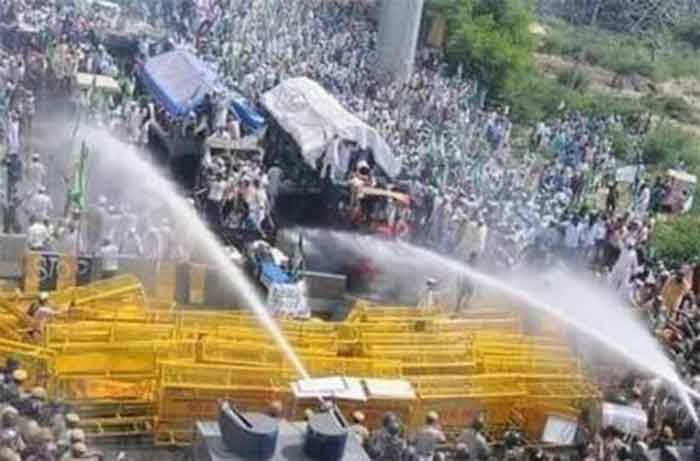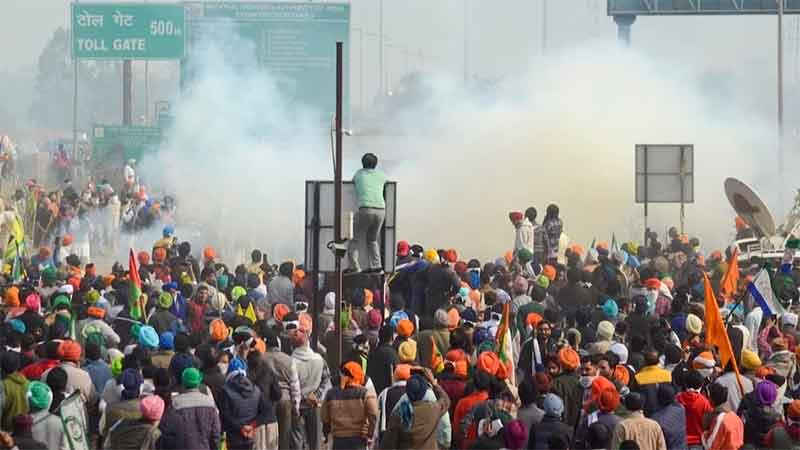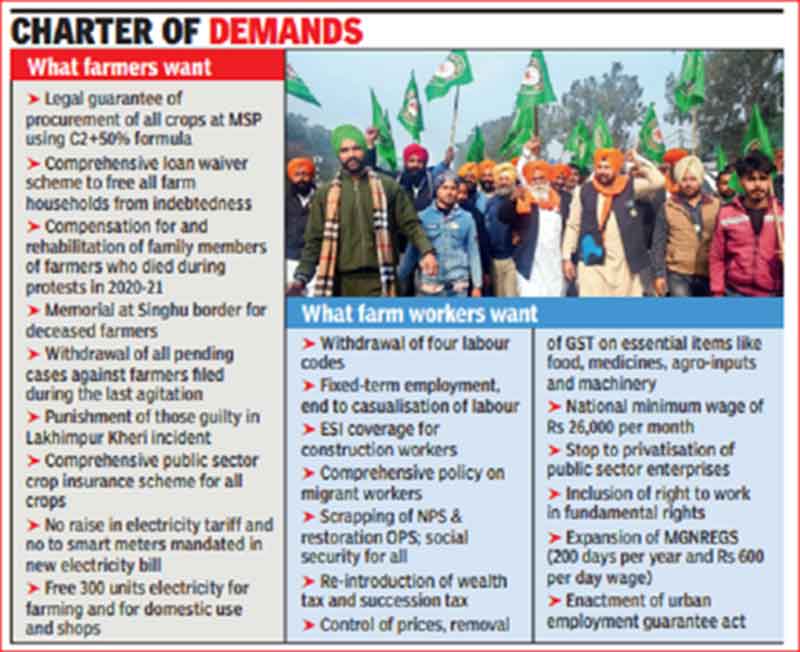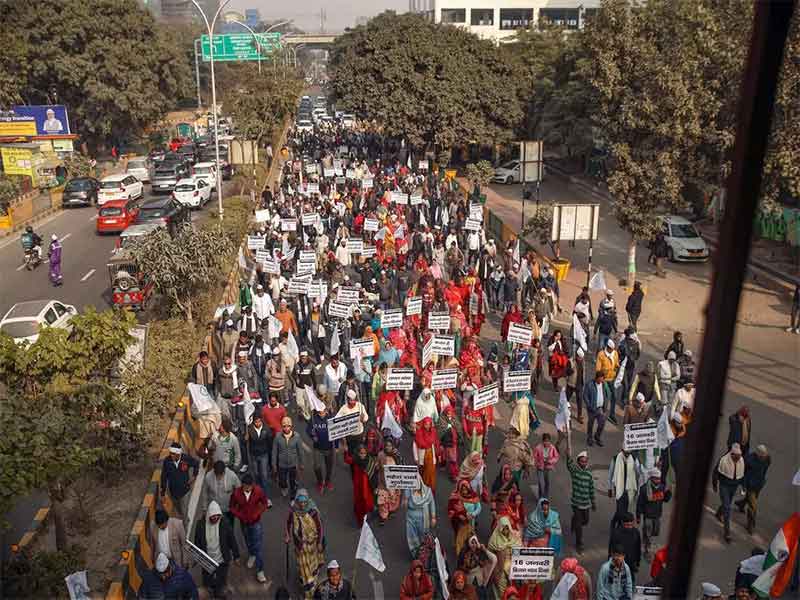
‘Sarkar ki asli majburi; ambani, adani, jamakhori’ (The Compulsions of the government is Ambani, Adani and hoarding cum corruption). This is the slogan that the protesting farmers are raising these days in the course of their nationwide struggle for their dignity and rights. Though very brief, but this slogan expediently and succinctly captures the issue, the farmers are foregrounding. On the one hand, they are stating that this government fell into the trap it set to attract the ruthless corporates to frame policies and programs in their favour and in their turn get funded to fight the elections. It is better to state to purchase MLAs and MPs. On the other hand, these corporates are engaged in business to make profit at all cost. Taking into account this crucial factor, the farmers and the entire country except the andha bhakts (blind followers) of BJP and RSS are opposing this corrupt and cruel move of the government and the corporates.
There are some politicians, officials and andha bhakts who keep claiming that the farmers’ struggle will die out soon or will be dealt severely soon. They are referring to the brute force this fascist regime is known for using against anyone whom it thinks are not in their side. Though the farmers have taken this threat seriously, they are not dismayed by this kind of threat since this is the basic characteristics of this regime. They on the other hand have shown their resolve to continue protesting in a democratic and non-violent manner till they force the government to totally withdraw all the 3 ordinances and concede to their other demands. Further, with the entire nation in solidarity with the farmers, there is the possibility of overthrowing this regime in a democratic manner.
To those who pride in the infallibility and sureness of this regime, it is better to remind them that it is this country which has shown to the world repeatedly that non-violent and apolitical struggle for independence and liberation. Let us present some examples to educate those who do not know these historical facts. One of the most powerful and significant event was the Salt March led by Mahatma Gandhiji and participated by the entire Indians then.
The Salt March, also known as the Salt Satyagraha, Dandi March and the Dandi Satyagraha, was an act of non-violent and peaceful civil disobedience during the colonial rule led by Gandhiji. It was a 24 day march which lasted from 12th March, 1930 to 5th April, 1930 as an action carried out as a campaign to resist imposition of tax by the British regime. This also was to resist the monopoly of British over the most essential commodity salt. From hindsight it can be said that though Gandhiji began this as a satyagraha to resist colonial move, he visualised the potential of overthrowing the colonial rulers from the country. Historical records bear testimony to this fact that Mahatma Gandhi began this march just with 78 of his followers. But as these people moved towards the salt pan, thousands of people joined and thus a distance of over 384 kilo meters were covered. This triggered off ripple effect and in other parts of the country too similar resistance took place. Gandhiji’s small effort sparked off to a large scale acts of civil disobedience against the salt laws by millions of Indians.
It is significant to note that Gandhiji was arrested on the midnight of 4th May, 1930, just days before the planned action at Dharasana. This further ignited the Indian masses to join in the satyagraha even more. On the other hand, it also attracted worldwide attention towards the struggle for azadi or independence. Interestingly, the struggle continued for a year, till Gandhiji was release from the jail. Further, although over 60,000 Indians were jailed as a result of the Salt Satyagraha, the British regime did not accede to the demands of the people. But the struggle continued and the country got its independence.
It is expedient to present the warnings given by Dr. Ambedkar in his last speech to the Constituent Assembly on November 25, 1949. He strongly spoke of the need to give up the grammar of anarchy, to avoid hero-worship, and to work towards a social – not just a political – democracy. He warned, “On 26th January 1950, India will be an independent country. What would happen to her independence? Will she maintain her independence or will she lose it again? This is the first thought that comes to my mind. It is not that India was never an independent country. The point is that she once lost the independence she had. Will she lose it a second time? It is this thought which makes me most anxious for the future”.
Dr. Ambedkar went on to declare, “Will history repeat itself? It is this thought which fills me with anxiety. This anxiety is deepened by the realisation of the fact that in addition to our old enemies in the form of castes and creeds we are going to have many political parties with diverse and opposing political creeds. Will Indians place the country above their creed or will they place creed above country? I do not know. But this much is certain that if the parties place creed above country, our independence will be put in jeopardy a second time and probably be lost for ever. This eventuality we must all resolutely guard against. We must be determined to defend our independence with the last drop of our blood”.
Thus, there are historical precedence in this country of the masses that the Indians in general will not succumb to the sinister plans of any establishment. This is all the more the case of the protesting farmers who have moved from their original demand of ‘Minimum Support Price’ (MSP), Abolition of Electricity Ordinance, etc., to issues of democracy, secularism, socialism and upholding constitutional values. In this article, we want to discuss the scenario before and after the promulgation of farm ordinances, farm ordinances and challenges they pose, the demands of the farmers, the protest of the farmers and the solidarity extended, repression by the state and establishment of Swaraj in India by the overthrow of this fascist, authoritarian, and anti-people, anti-farmers regime.
Before and after Farm Ordinances
It is not argued that the farmers never faced crisis in the past and the ruling elite of the country was in favour of the farmers. Farming sector along with land needed and needs a major reform. This has been a huge demand for ages. But over the years, every regime played with the life, land, labour and livelihood of this rural segment. From 1991, all the governments blatantly favoured the capitalists and corporates. The present government in a special way has become an instrument in the hands of the corporates, especially that of the Ambanis and Adanis. Since these corporates fund the election expenses of the BJP government, the government in turn has to attend to their business interest even at the cost of farmers and agriculture.
In the past, the farmers were at the mercy of the sahukars, that is, local, petty businessmen. It is a social fact that the sahukars did not have any morality of business. But since the farmers and they were locally residing, there was some local pressure. There was a sense of ‘give and take’ between them. The farmers used to borrow money from the sahukars for their needs and once the harvest is done, they would sell the grain to them and settle the account. Since the government was also pro-people and pro-farmers, there was some pressure for fair price. Since the grain was purchased with a fair price it was also sold for an affordable price for the consumers.
But for the last 10 years, the corporates seeing huge profit in farming sector have entered in a big way and have tried to monopolise agriculture, stocking, marketing and consumption. Since profit is the only motive of these corporates, they play with the compulsions of the farmers and purchase from them for lower rate than the Minimum Support Price (MSP). But they sell for higher price in the market. Thus they cheat the farmers and also cheat the consumers. More than the sahukars, who are locally based, the corporates have no morality of any kind when it comes to business. It is this group of profit makers and billionaires, the present government has decided to take side with against the farmers who are ‘anna data’, that is, provider of food’.
Farm Ordinances and Challenges they Pose
As we are aware, during the monsoon session, that is, during September the Parliament of India passed three bills now acts related to agriculture. They are: 1) Bill on Agri-Market – Farmer’s Produce Trade and Commerce (Promotion and Facilitation) Act, 2020; 2) Bill on contract farming – The Farmer (Empowerment and Protection) Agreement of Price Assurance and Farm Services Act, 2020; and 3) Bill relating to commodities: The Essential Commodities (Amendment) Act, 2020.
A careful reading of these three ordinances aim to increase the availability of buyers for farmers’ produce, by allowing them to trade freely without any license or stock limit, so that an increase in competition among them results in better prices for farmers. While the ordinances aim to liberalise trade and increase the number of buyers, de-regulation alone may not be sufficient to attract more buyers.
It is claimed by the government that the Trade and Commerce Ordinance provides buyers the freedom to buy farmers’ produce outside the Agricultural Produce Market Committee (APMC) markets without having any license or paying any fees to APMCs. The Contract Farming Ordinance provides a framework for buyers and farmers to enter into a contract , before a crop season starts which guarantees farmers a minimum price and buyers an assured supply. The third Ordinance amends the Essential Commodities Act to provide that stock limits for agricultural produce can be imposed only when retail prices increase sharply and exempts value chain participants and exporters from any stock limit.
The three Ordinances aim to increase the availability of buyers for farmers’ produce, by allowing them to trade freely without any license or stock limit, so that an increase in competition among them results in better prices for farmers. While the Ordinances aim to liberalise trade and increase the number of buyers, this may not be sufficient to attract more buyers. In the given Indian political, socio-economic and market system and culture, the farmers, especially the poor farmers along with other farmers who will loose out.
Till now APMC is a state prerogative and since the state governments are closer to the farmers, there were checks and balance. But now there is an attempt to centralise this too. For example, in 2006, Bihar repealed its APMC Act with a similar objective to attract private investment in the sector and gave charge of the markets to the concerned sub-divisional officers in that area. Most of these officials are knee deep in corruption and nepotism and they do not bother about the welfare of the farmers. This resulted in a lack of required marketing infrastructure as the existing infrastructure eroded over time due to poor upkeep. Secondly, in unregulated markets, farmers faced issues such as high transaction charges and lack of information on prices and arrival of produce.
Taking into account this fact, the Committee of State Ministers, constituted in 2010 for agricultural marketing reforms, observed that complete deregulation of markets did not help in attracting any private investment. It noted that there is a need for an appropriate legal and institutional structure with a developmental type of regulation to ensure orderly functioning of markets and to attract investment for infrastructure development.
The Standing Committee (2018-19) noted that Gramin Haats or small rural markets, can emerge as a viable alternative for agricultural marketing if they are provided with adequate infrastructure facilities. It recommended that the Gramin Agricultural Markets scheme (which aims to improve infrastructure and civic facilities in 22,000 Gramin Haats across the country) should be made a fully funded central scheme and scaled to ensure presence of a Haat in each panchayat of the country. But for this very concrete recommendation, the central government has proposed development of basic infrastructure in Gramin Haats. Instead of engaging in developing the agricultural sector, the present government is planning to sell out farming sector to corporates.
It is a given fact that the Indian agriculture sector contributes nearly 15% to India’s economic growth. It also employs over 50% of the country’s population. In the past few decades, especially in the last decade, the sector has witnessed a crisis of productivity, indebtedness and farmers’ suicide: in Maharashtra alone over 396 cases were reported between 1st January 2019 to 28th February 2019 and over 501 in Punjab in 2019. The present regime has nothing say or do about this sad plight of the farmers but wants to further force them to deprivation and suicide.
An Unprecedented Protest
It is significant to note that Narendra Modi won the last elections on the promise of doubling farm income. As usual tall on promises and short on implementation. Now to please the Ambanis and Adanis, he and his coterie have promulgated a set of laws that look to strengthen corporate profits rather than farmers’ income and have in the process compromised farmers’ dignity and their rights over land, labour and livelihood. Especially in the last one decade, corporate led growth has, led to massive corporate profits and poverty and penury for the workers in every sector. The next target is farm sector.
What is absolute madness is that over 86% of India’s cultivated farmland will be put at the mercy of big corporates. The acts enacted will do away with the minimum support prices, farm loans, fertilizer subsidies, give and take relationship between the farmer and labourers, and even the legal channels of dispute settlement through regular courts. The farmers fear an increased input burden, debts, losses and increase farm suicides and above all displacement from land by the corporates through the government. The farmers further fear that if these 3 ordinances are allowed to be implemented, they, their families, their society, culture and everything will be subjected to the corporate and destruction is the only reality. Hence, they began to protest first, individually or organisationally but now this has taken an all India and all sector resistance movement.
Chronologically speaking, on 24th September, 2020, the farmers started a “Rail Roko”, or “halt stop the trains’ campaign, following which train services to and from Punjab were affected severely. Realising the naked truth that the government is not even taking notice of their campaign, on 23rd October, some farmer unions decided to call off the campaign, as supplies of fertilizer and other goods in the state were starting to run short. Apprehending that neither the state governments and central governments are paying no heed to their demand, the farmers decided to march to Delhi to exert pressure on the central government. On 25th November, when the farmers reached the borders of Delhi, they were met with tear gas and water cannons, dug up roads, layers of barricades, sand barriers, etc. to stop them from proceeding. Due to the suppression 3 farmers died.
The march to Delhi was accompanied by a 24-hour strike of 25 lakh people across India on 26th November, 2020, in opposition to both the farm law reform and proposed changes to labour law. Further, between 28th November to 3rd December, the number of farmers blocking Delhi was estimated to be 15 to 20 lakhs. Thus this has boomeranged to be one of the unprecedented protest.
Meanwhile, the Government Of India announced 3rd December, 2020, for discussing the future of the new farm laws, despite protesters’ demands that the talks should take place immediately. Moreover, it also stated that it would only talk to a select group of farmer unions, where the Prime Minister would be absent. While the government wanted the farmers to move away from Delhi to a protest site in Burari, on the outskirts of the city, the farmers preferred to stay at the borders and instead put forward a proposal of protesting at Jantar Mantar.
Further, the farmers’ unions announced that on 4th December, they would burn effigies of the Prime Minister and leaders of corporates. Farmers decided to return their awards and medals on 7th December and to organize Bharat Bandh on 8th December. Dissatisfied with the government’s proposal for change in the ordinances, on 9th December, the farmers decided to block the Delhi-Jaipur highway on December 12th and nationwide dharna on December 14th.
Farmers’ protest is coordinated by the farmers collectives like Samyukt Kisan Morcha and All India Kisan Sangharsh Coordination Committee. The following are some of the farmers’ unions and collectives: Bharatiya Kisan Union (Ugrahan, Sidhupur, Rajewal, Chaduni, Dakaunda), Jai Kisan Andolan, All India Kisan Sabha, Karnataka Rajya Raitha Sangha, All India Kisan Khet Majdoor Sangathan, Rashtriya Kisan Majdoor Sangathan, All India Kisan Mazdoor Sabha, Krantikari Kisan Union, ASHA-Kisan Swaraj, All India Kisan Mahasabha, Punjab Kisan Union, Swamibhiman Shetkari Sanghatana, Jamhoori Kisan Sabha, Kisan Sangharsh Samiti, Terai Kisan Sabha, etc.
The Demands of the Farmers
The farmers began with the following demands which were directly related to their sector:
- Repeal all the 3 new farm laws
- Convene a special Parliament session to repeal the farm laws
- Make minimum support price (MSP) and state procurement of crops a legal right
- Assure that conventional procurement system will remain
- Cut diesel prices for agricultural use by 50%
- Abolish of the Electricity Ordinance 2020
- Remove punishment and fine for stubble burning
- Release farmers arrested for burning paddy stubble in Punjab
- Implement Swaminathan Commission Report 2006.
But it is significant to note that now the farmers have gone still further and have demanded that the central government should not interfere in state subjects and should revert back to decentralization of power. They are also demanding for the withdrawal of all cases against and release of farmer leaders, human right activists, poets, intellectuals and writers. They are also specifically demanding for the release of all the people arrested during and after CAA protest and all other political prisoners. Not limiting their demands only for farm sector, they have included their right over land, labour and livelihood. Further, this struggle has become a national satyagraha demanding reform in the polity, economy, culture and society.
Thus, their demand is not just for their rights but for the rights of over 133 crore population of India.
National and International Solidarity
All sector and people of all walks are supporting the farmers’ protest realising the fact that if the farmers loose out to the corporates on the behest of this present oppressive regime, their rights as citizens of India also can be under threat. Transport bodies such as the All India Motor Transport Congress (AIMTC), representing about 9.5 million truckers and 5 million bus and taxi drivers, have threatened to halt movement of supplies in the northern states, further adding that “We will then escalate it to entire country if the government fails to address the farmer’s issues.”
Trade unions have out with huge support to the farmers and their demands. From 1991, when the liberalisation process was set on motion by the Congress government, unions were made powerless. But at this juncture, they have become very active. The unions that supported the farmers’ stir includes Indian National Trade Union Congress (INTUC), All India Trade Union Congress (AITUC), Hind Mazdoor Sabha (HMS), Centre of Indian Trade Unions (CITU), All India United Trade Union Centre (AIUTUC) and Trade Union Co-ordination Centre (TUCC) have come out in the open in solidarity with the striking farmers. Medical personnel provided free medical support to the farmers.
Civil society organisations have come out in open to support this struggle. Some of them are: National Alliance for People’s Movements, Lok Sangharsh Morcha, etc. Innumerable civil and faith based organisations have taken to roads to protest along with the farmers.
A group of sportspersons and farmers have started a laundry service using multiple washing machines at Delhi’s Singhu border to help protesters to avoid going home to bring back clean clothes. It was reported that the laundry service was started simply to make things easier for the farmers who are protesting at the Delhi-Haryana border. The washing machines run 8-10 hours every day. Those who are doing this humanitarian service stated that the farmers’ phone numbers and details of their camping location are taken and washed clothes are delivered to them daily( Reported by the Times of India. 11/12/2020).
“Bar Council of Delhi asks Prime Minister Narendra Modi to withdraw Farmers Acts”. This was the headlines on 2nd December, 2020 of the Bar and Bench Media House of the lawyers. The Bar and Bench news item further cautioned that, “BCD has stated that the surreptitious insertion of provisions in the Farmers Acts on bar on civil courts will pose a serious threat to the existing judicial institution and the principle of separation of powers”. In its letter dated December 2, the Bar Council of Delhi (BCD) has claimed that apart from being against the farmers, the Acts are also detrimental to the interest of legal professionals.
The letter goes on to state that “We can’t be unmindful of the fact that a strong judicial institution to check administrative arbitrariness and unfair treatment is essential in a democratic republic and not an amenable executive authority. Introduction of Conciliation Board to be constituted by SDMs, headed by his junior officer, as Chairman is distractive and unaccepted…SDMs/ADMs are always under the command of their bosses, which is antitheses to judicial independence and discipline.”
Conscious medical personnel supported the protesting farmers by providing free medical camp. The Indian Church with its vast medical establishments could have provide health care at least in the name of humanitarian service. Though these were blocked from reaching the spot, they ventured and brought the ambulance along with them to attend to the health care of the farmers. The conscious citizens and doctors did this in solidarity with the farmers, since they are fighting for them too.
When the farmers called for Bharat Bandh (total blockade) on 8th December, 2020, they found full and unprecedented support from all the Indians. In Gujarat while the state government warned that it would take stringent action on those who organise and participate in the strike, over 23 farmers’ groups have formed a platform called, Gujarat Khedut Sangharsh Samiti in support of the protesting farmers. Political parties like the CPI, CPIM, DMK, NCP, Samajwadi Party, RJD, Trinamool Congress, TRS, AAP, Shiv Sena and the Congress are supporting this nationwide strike.
Interestingly, BJPs ally Rashtriya Lok Dal has come out in support of the bandh. It is also significant to note that the Bharatiya Kisan Sangh an affiliate of the RSS has declared that it will not join the bandh but would like the legislations to go through some improvements.
But the All India Kisan Sangharsh Coordination Committee has warned the political parties to leave their party banners at home and come as citizens and not as representative of political parties if they want to fight against the undemocratic government. This is a clear message to all that this is an apolitical struggle and not led or sponsored by any political party. The agitating farmers are communicating that this struggle is not just to demand for the revoking of all 3 farmers’ ordinances. They are also not just wanting to overthrow the present regime. But they want a total overhaul in the socio-economic, political, cultural, religious, educational, agricultural, employment systems of the country. Thus, the farmers have clearly exhibited their resolve that this is a non-party but political, peaceful and outcome oriented struggle.
It is expedient to highlight this fact here that solidarity has been expressed at the international level too. On Tuesday, 1st December, 2020, Justin Trudeau, the Prime Minister of Canada, decided comment on the ongoing farmer’s protests in India. “The news coming out of India about the protest by farmers is concerning and we are all worried about family and friends. I knew that is a reality for many of you,” Trudeau went on to add, “Let me remind you, Canada will always be there to defend the rights of peaceful protests.”
Advocate and activist Prashant Bhushan tweeted, “I am happy that Canadian PM Trudeau has spoken out for Right To Protest in a democracy & for our farmers rights. It is important for all leaders worldwide to stand up for the democratic rights of people in all nations. Those saying that this is an internal matter have got it all wrong.”
Also, NDTV again on 6th December, 2020 published this news that “Thousands Protest In London, to Support Indian Farmers, Several Arrested. Police officers in face masks asked people to disperse from the ‘We stand with farmers of Punjab’ demonstration, warning about COVID-19 curbs on demonstrations”. It is reported that a crowd of demonstrators converged on the Indian embassy, located on Aldwych, a major artery in the centre of the British capital, and groups marched around the Trafalgar Square area in London.
Further, this protest comes after a group of 36 British MPs led by British Sikh Labour MP, Tanmanjeet Singh Dhesi had written to UK Foreign Secretary Dominic Raab asking him to make representations to his Indian counterpart S. Jaishankar over the protests in India. While the Indian Embassy in the UK and the Indian government vehemently criticised the protestors saying that it is in negotiations with the farmers and at this time any protest is uncalled for.
It is reported widely in the foreign media that protests were organised by Indo-Americans in New York, Chicago, San Francisco, Houston, Michigan, Washington, Indianapolis and Atlanta. Several American Congressmen both from the Democratic and Republic parties came out in open to lend their support. Protests were witnessed and continues to go on unabated in Australia and New Zeeland.
Non-Violent Struggle with Warnings
Against the false propaganda by the ruling establishment and the partisan media, the protesting farmers and the Indian masses and conscious citizens, the farmers have stuck to this struggle totally based on Satyagrah, that is, non-violent, peaceful but forceful movement. The farmers are aware that they are pitted against an aggressive, authoritarian, autocratic, undemocratic regime. They are also aware of the fact that the BJP-RSS, Brahmin-Bania, Ambani-Adani, Howdy Modi-Rowdy Trump combination will go to any extent to break the Satyagrah. Also, they are aware that brute force will be used against them. Further, they know that this cruel regime will use mind power and media power to discredit their genuine struggle. Hence, they are prepared for a long drawn out Satyagraha.
If the government is adamant on its stand and is not willing to concede to the demands of the farmers, the farmers have decided to block roads and trains. They have also called for a nationwide strike on 14th December. This time, the bandh will percolate to the district level. Interestingly Anna Hazare has also warned that if the government fails to concede to the demands of the farmers, he will undertake ‘jan andolan’, that is, ‘people’s movement’, similar to the campaign he initiated for Lokpal Bill.
Leaving out the andha bhakts, all the Indians are realising this fundamental fact, “NO FARMERS – NO CULTIVATION, NO FARMERS – NO FOOD, NO FARMERS- NO LIVELIHOOD, NO FARMERS – NO LIFE”. It is the hard labour of the farmers in sun and rain, day and night which provides food to all. If the farmers are denied of their rights which the present government wants to do, then the citizens of this country will die of starvation. Thus, it is not the external agency as propagated by the government that thrives on falsehood but it is the government and its affiliates who will ruin this country.
Those Indians and the international community who are examining this struggle without a partisan approach are stuck by this undeniable fact that the farmers’ protest which began with the demand to withdraw the 3 pro-corporate and anti-farmer ordinances has boomeranged into a much larger, wider and broader national struggle for democracy, secularism and independence from a repressive and retrogressive regime. It has snowballed into becoming a struggle to uphold farmers’ sovereignty over agriculture and in extension on their land, labour and livelihood. Above all, this national protest has become an historic farmers’ led resistance and struggle to reclaim democracy, secularism and socialism from the fascist Hindutva forces and their stooges.
Prakash Louis is Founder of Indian Christians for Democracy
SIGN UP FOR COUNTERCURRENTS DAILY NEWSLETTER














































